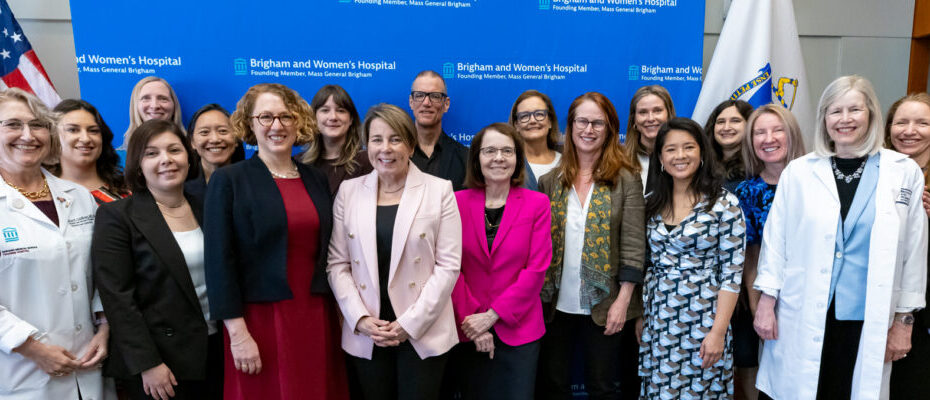Dr. Emily Lau, fifth from right, and MGB CEO Dr. Anne Klibanski at Governor Healey’s announcement ceremony.
Dr. Emily Lau, MD, MPH, is part of a select group of awardees receiving a total of $2.6 million in grant support from the Massachusetts Life Sciences Center (MLSC) Women’s Health Innovation program for translational stage research on improving women’s health outcomes. The awards were announced on April 15th by Governor Maura Healey.
Also present at the announcement was Mass General Brigham president and CEO, Anne Klibanski, MD who acknowledged the MGB researchers driving new insights to improve women’s health outcomes. “We are so proud of the incredible work that goes on here every single day – and the people who do it,” she said.
The governor’s announcement was part of a broader effort to spotlight Massachusetts leadership in both life sciences and women’s health. Key to realizing this commitment is the role that the MLSC provides in spurring translational projects. The aim of the Center’s Women’s Health Initiative is to bring capital and incentives to bear in a coordinated tactic to realize solutions to diseases or conditions that affect women solely, disproportionately, or differently.
One of three key programs in the Initiative is the MSLC’s Women’s Health Innovation Grants program, which focuses on projects with translational potential and preliminary supporting data, but that still require a key set of proof-of-concept experiments prior to attracting a commercial partner or spinning out into a new company.
Lau’s project “Prediction of Pregnancy Outcomes Using Deep Learning Estimation of Cardiorespiratory Fitness (VO2 PEAK)” aims to apply a machine learning model that predicts cardiorespiratory fitness (peak VO2) from the 12-lead ECG in pregnancy to identify women who are at high risk for developing adverse pregnancy outcomes. Lau leads a clinical-translational program focused on understanding how biologic sex differences and female-specific cardiovascular risk factors contribute to the pathogenesis of cardiovascular disease uniquely in women.
